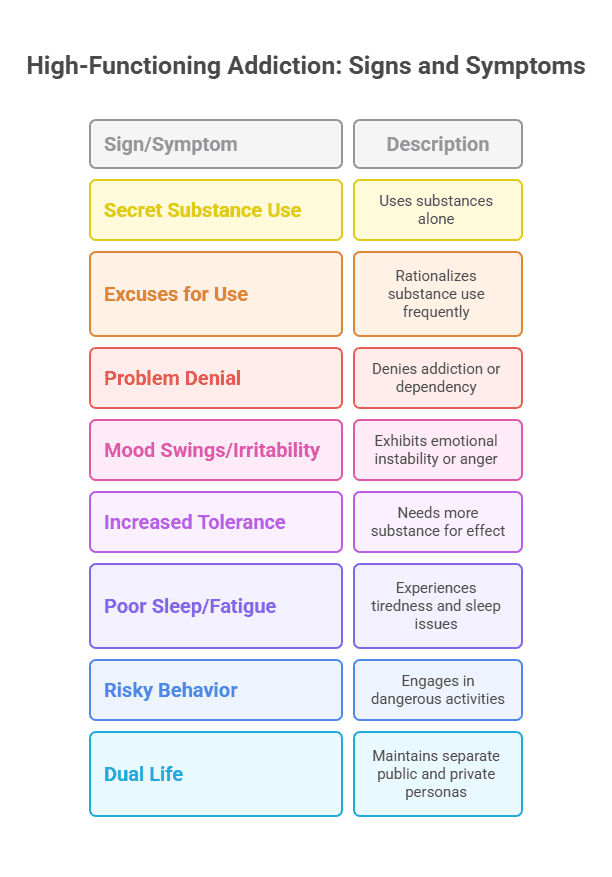When we think of someone struggling with addiction, we often imagine a person whose life is falling apart—someone who cannot hold a job, maintain relationships, or take care of daily responsibilities. But not all addictions look like this. In fact, many people who are addicted to alcohol, drugs, or prescription medications may appear to be doing just fine on the outside. These individuals are known as high-functioning addicts.
In this blog, we will explain what high-functioning addiction is, how to identify the warning signs, and why it’s important to seek help early. This article is specially written for Indian readers to understand the issue in the local context.
What Is High-Functioning Addiction?
High-functioning addiction refers to a situation where a person is addicted to substances but still manages to maintain their everyday responsibilities. They may:
- Go to work or run a business
- Take care of their family
- Pay bills on time
- Appear happy and successful in public
Examples of High-Functioning Addicts in India
In India, you may come across:
- A businessman who drinks heavily every night but performs well at work
- A housewife dependent on sleeping pills but handles household chores
- A college student using cannabis or stimulants but scoring high marks
- A tech employee taking painkillers to handle pressure and deadlines
Because these individuals “seem fine”, their addiction is often ignored or unnoticed, even by close family members.
Why Is High-Functioning Addiction Dangerous?
High-functioning addicts may not show visible problems early on, but addiction always worsens with time. Some key dangers include:
- Health deterioration without warning signs
- Sudden emotional breakdowns
- Risk of accidents or overdose
- Development of mental health issues like anxiety or depression
- Strained family relationships due to hidden behaviours
The longer the addiction is hidden, the harder it becomes to treat.
Signs and Symptoms of High-Functioning Addiction
Here are the most common signs that someone may be a functioning addict:
1. Using Substances in Secret
They may drink or use drugs alone, especially when no one is watching. They might hide bottles, medicines, or paraphernalia.
2. Making Excuses to Use
They always have a reason to drink or use—“I’m stressed,” “It helps me sleep,” “Just this once,” or “Everyone does it.”
3. Denial of a Problem
They may say, “I’m not an addict,” or “I can quit anytime I want.” This denial is a major obstacle to recovery.
4. Mood Swings or Irritability
Despite their success, they may show emotional outbursts, get angry quickly, or become withdrawn at home.
5. Increased Tolerance
They need more of the substance to get the same effect. For example, from 2 drinks to 4 drinks daily.
6. Poor Sleep or Fatigue
Even if they’re productive, they often look tired, have irregular sleep, or complain of headaches and body pain.
7. Risky Behaviour
They may drive under the influence, mix substances, or neglect health without realizing the consequences.
8. Keeping a Dual Life
They may act one way in public and another in private. This double life creates emotional and mental stress.
Common Substances Involved in High-Functioning Addiction
- Alcohol – This is the most common. People justify regular drinking as “social drinking” or stress relief.
- Prescription Drugs – Sleeping pills, painkillers, or anti-anxiety medications are often misused in middle-class and upper-class Indian homes.
- Cannabis and Stimulants – Used by students and professionals to boost creativity, reduce anxiety, or stay awake longer.
- Tobacco and Nicotine – Often overlooked, but highly addictive and used as a coping mechanism.

Why Is It Hard to Recognize?
In Indian society, we tend to overlook addiction if someone is doing well in life. There are also cultural and social pressures that keep people from speaking openly.
Common Misunderstandings:
- “He has a job and family, how can he be an addict?”
- “She only takes pills prescribed by a doctor.”
- “Drinking is normal in business meetings.”
- “Smoking helps him stay calm.”
Such statements hide the seriousness of the problem.
Mental Health and High-Functioning Addiction
Many people who have high-functioning addiction also suffer from mental health issues like:
- Depression
- Anxiety
- Insomnia
- Work-related stress
They use substances to cope, which only makes their mental health worse. This is called a co-occurring disorder or dual diagnosis.
How to Talk to a High-Functioning Addict
Helping someone who doesn’t believe they need help is difficult. Here are some tips:
- Be non-judgmental: Avoid blaming or shaming
- Express concern: Focus on their health and well-being
- Use real examples: Point out specific incidents caused by substance use
- Suggest professional help: Gently recommend seeing a doctor or therapist
- Be patient: It takes time for them to accept the truth
Treatment for High-Functioning Addiction
At Alpha Healing Center, we offer confidential and holistic treatment for individuals struggling with high-functioning addiction.
1. Inpatient Rehabilitation
Our residential treatment programs offer a peaceful, private environment for healing. It includes:
- Medical detox (if required)
- Individual counselling
- Group therapy
- Mindfulness and yoga
- Relapse prevention strategies
2. Detoxification and Rehabilitation
For people with physical dependence, a medically supervised detox is the first step. This helps safely remove the substance from the body.
After detox, our clients continue with inpatient rehab, where they receive full-time care, therapy, and support in a calm, peaceful environment.





